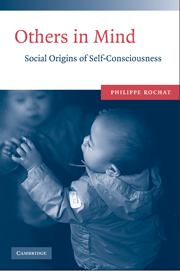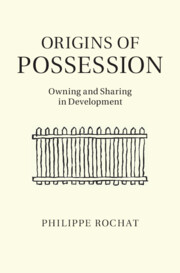Others in Mind
Why are we so prone to guilt and embarrassment? Why do we care so much about how others see us, about our reputation? What are the origins of such afflictions? Philippe Rochat argues that it is because we are members of a species that evolved the unique propensity to reflect upon themselves as an object of thoughts; an object of thoughts that is potentially evaluated by others. But, the argument goes, this propensity comes from a basic fear: the fear of rejection, of being socially "banned" and ostracized. Others in Mind is about self-consciousness, how it originates and how it shapes our lives. Self-consciousness is arguably the most important and revealing of all psychological problems.
- Integrates developmentally informed approaches to provide a new synthesis and theory on the nature and origins of human self- consciousness
- Covers a universal human phenomenon, combined with a unique philosophical argument
- New perspective on the developmental origins of self-concept that combines cognitive, cross-cultural and evolutionary approaches
Reviews & endorsements
“This exceptional book is an inspiration for all clinicians conducting psychotherapy. The nature and development of self consciousness is rarely treated in depth, yet self consciousness is at the core of ‘psychic structure’ and function. Accordingly, it is key in understanding psychopathology. Others in Mind does just that. It explicitly and implicitly provides new perspectives on the processes of treatment and suggests further clinical paths to explore. Bravo! This book was greatly needed.”
—Daniel N. Stern, Cornell University Medical School
“An utterly unique voice, passionately combining the scholarly and the personal. A book that first of all engages, but also informs. What could be more interesting than how we learn about ourselves through others?”
—Michael Tomasello, Max Planck Institute for Evolutionary Anthropology, Leipzig, Germany
“Bold in its reach and profound in its implications, this highly original book makes the startling claim that fear of rejection by others drives human self consciousness and an obsessive concern for self. Rochat argues paradoxically that the extended dependency of human infancy on the attentiveness of others for survival and care produces at once a deep need for affiliation and a pervasive terror of rejection. This theme is persuasively worked through for many of the most important concerns of the self in social, cultural, and moral spheres throughout life.”
—Katherine Nelson, CUNY Graduate Center
“So many talk about the self, so few get beyond clichés. This bold book delivers. Bringing together a wealth of research, Rochat forges a comprehensive vision which is truly original. Psychotherapy clinicians, like other readers, will find their grasp of human reality never again the same.”
—George Downing, The Psychiatric Teaching Faculty, Salpetriere Hospital, Paris
"Examines the human propensity for self-consciousness..."
--The Chronicle of Higher Education
"...Rochat presents a bold challenge for psychology, one that stresses the importance of group living and the sharing of resources as essential for human survival...[Essential]..."
—S. Krippner, Saybrook Graduate School & Research Center
"...thought provoking, learned, and also daring... Others in Mind is an elegantly written essay that will inform, provoke, and inspire thought about the origins of human self-consciousness... It will reward the scholarly reader with new
perspectives on a topic of classic and continuing importance."
—Ross A. Thompson, PsycCRITIQUES [March 17, 2010, Vol. 55]
Product details
February 2009Paperback
9780521729659
264 pages
231 × 152 × 23 mm
0.41kg
7 b/w illus.
Available
Table of Contents
- Foreword
- Introduction: main ideas
- 1. Self-conscious species
- 2. Six propositions
- 3. Variety of self-reflective mind states
- 4. Mind states in development
- 5. Birth of self-consciousness
- 6. Shame and self-knowledge
- 7. Roots of guilt
- 8. Giving and sharing
- 9. Origins of owning and sharing
- 10. Social construction of identity
- Conclusion: moral space and the self
- Post-script note.





